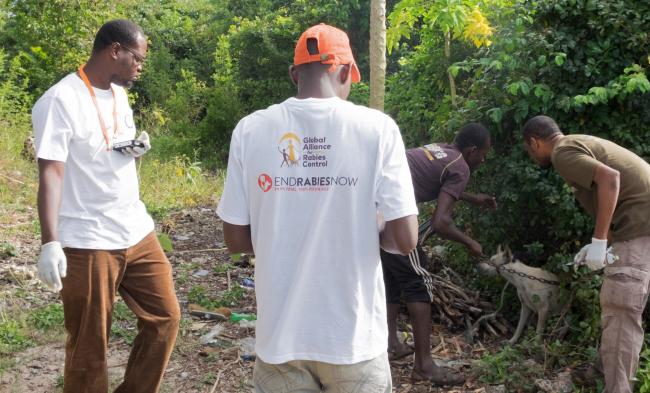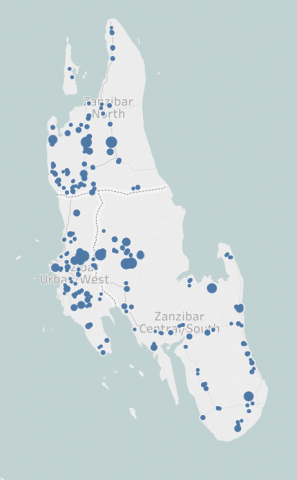Towards freedom from canine-mediated rabies in Zanzibar: Island-wide strategic dog vaccination
The popular tourist destination of Zanzibar is located off the eastern coast of Africa. If you ask any tourist or local resident what is noteworthy about Zanzibar they will most likely tell you all about the white sandy beaches, blue tropical waters and long history of Stone town. What you probably won’t hear about is how Zanzibar has been taking large strides towards controlling and eliminating rabies using mass dog vaccination. In fact, Zanzibar is very close to being declared the first region in Africa to be free from rabies
Between 2009 and 2015, Zanzibar undertook the “Rabies Control and Dog Management Project” in collaboration with World Animal Protection, an international non-profit animal welfare organization. Over the course of the seven-year period that the program was operational in Zanzibar, the dog population was subjected to multiple rounds of annual rabies vaccination and a good overall vaccination coverage was achieved in the early years of the project. Despite the annual fluctuation in the estimated vaccinated coverage over the seven-year period, the overall vaccination coverage was sufficient enough to ensure a steady decline in the number of clinically confirmed canine rabies cases, until what was suspected to be the last case of canine rabies was diagnosed clinically in 2015. At this point, the Zanzibar government hoped to officially declare the island free from canine rabies.
In 2016, the Global Alliance for Rabies Control (GARC), in collaboration with the Zanzibar government, established an active rabies surveillance program on the island. Since then, a small number of rabies-positive cases have been detected, preventing the declaration of freedom from canine rabies on the island. In response, the government took immediate action. Instead of undertaking a large-scale mass dog vaccination campaign similar to those performed in the past, the local authorities collaborated with GARC and World Animal Protection in the development of a strategic vaccination program designed to focus primarily on areas where rabies cases have been detected, before moving outwards in a wave-like manner. This approach ensured that rabies transmission would be rapidly interrupted, before moving to the surrounding areas where healthy, but unvaccinated, dogs reside.
 To support the strategic dog vaccination campaign, GARC assisted with the planning of the campaign and its roll-out, in order to help guide the local authorities during their efforts. After many months of preparation, planning and public awareness campaigns across the island, the collaborative project started when the first dog was vaccinated against rabies on the 1st of August 2017. GARC was present in Zanzibar for the first two weeks of the campaign in order to assess, assist and guide the teams in a number of areas, including humane animal handling, and vaccination techniques. After using the two weeks to empower the local authorities with all of the skills and tools that they would need to make the campaign a success, the program has continued successfully under the direction of the local authorities, ensuring a sustainable approach over the coming months.
To support the strategic dog vaccination campaign, GARC assisted with the planning of the campaign and its roll-out, in order to help guide the local authorities during their efforts. After many months of preparation, planning and public awareness campaigns across the island, the collaborative project started when the first dog was vaccinated against rabies on the 1st of August 2017. GARC was present in Zanzibar for the first two weeks of the campaign in order to assess, assist and guide the teams in a number of areas, including humane animal handling, and vaccination techniques. After using the two weeks to empower the local authorities with all of the skills and tools that they would need to make the campaign a success, the program has continued successfully under the direction of the local authorities, ensuring a sustainable approach over the coming months.
The campaign started, assuming an immunologically naïve dog population and that no humans or animals were truly safe from rabies on the island. As of 6th October 2017, the campaign has been ongoing for 3 months and the estimated vaccination coverage is approximately 24% and growing daily. More importantly, all of the areas where rabies cases have been detected have been vaccinated and the campaign is now moving away from those cases in order to reach the dogs residing in the neighboring villages. The local authorities are working hard towards ensuring a 70% vaccination coverage across the entire island within next 2 months.
If you would like to contribute to the success of the strategic dog vaccination campaign in Zanzibar you can make a donation to GARC. For every $5 donation that we receive, GARC will ensure that one more dog, its owner and all of the people in the surrounding area, are protected from rabies by receiving a life-saving dose of rabies vaccine.
Article written by Andre Coetzer, GARC SA

